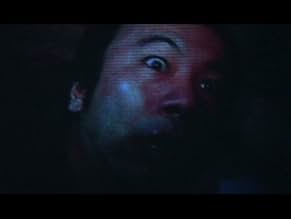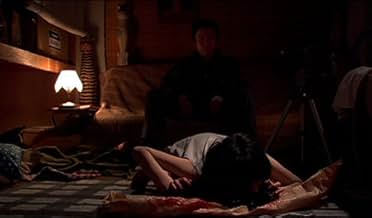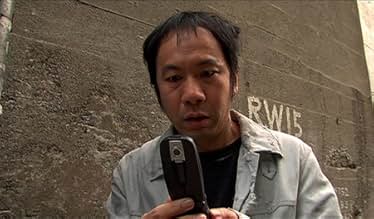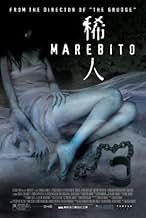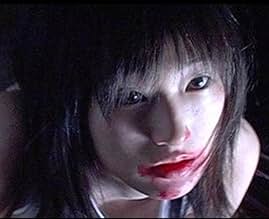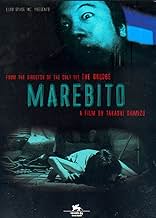IMDb RATING
6.0/10
5.9K
YOUR RATING
A fear-obsessed freelance cameraman (Shinya Tsukamoto) investigates an urban legend involving mysterious spirits that haunt the subways of Tokyo.A fear-obsessed freelance cameraman (Shinya Tsukamoto) investigates an urban legend involving mysterious spirits that haunt the subways of Tokyo.A fear-obsessed freelance cameraman (Shinya Tsukamoto) investigates an urban legend involving mysterious spirits that haunt the subways of Tokyo.
- Awards
- 2 wins & 1 nomination total
Featured reviews
This is a marvelous movie.
More than a psychological abyss than a straight horror, this little dagger stabs deeper than most of the pretentious psycho thrillers will ever.
Although this masterpiece is not for everyone. It offers a bunch of pretty disturbing scenes, but one has to watch it at least twice, in order to fully comprehend it's twisted metaphoric.
If you find this movie weird, just stop and think about how weirder is the whole mankind. Instead. Horrible thurths are revealed through this genius metaphor of vampyrism.
Cult director Shinya Tsukamoto (whom I'm a devotee) gives the hell out of a performance. This guy is either crazy, either true genius, either both. I'I'm so very impressed.
And a la fin, a quote from marebito: "Horror, is actually an ancient wisdom that we find deep in the memory of our souls....."
More than a psychological abyss than a straight horror, this little dagger stabs deeper than most of the pretentious psycho thrillers will ever.
Although this masterpiece is not for everyone. It offers a bunch of pretty disturbing scenes, but one has to watch it at least twice, in order to fully comprehend it's twisted metaphoric.
If you find this movie weird, just stop and think about how weirder is the whole mankind. Instead. Horrible thurths are revealed through this genius metaphor of vampyrism.
Cult director Shinya Tsukamoto (whom I'm a devotee) gives the hell out of a performance. This guy is either crazy, either true genius, either both. I'I'm so very impressed.
And a la fin, a quote from marebito: "Horror, is actually an ancient wisdom that we find deep in the memory of our souls....."
This was just a strange movie, but not in a cool way, like Forbidden Zone, or Uzumaki. Just weird.
All I can say is that a creepy voyeur cameraman sees a guy commit suicide by stabbing himself, and wonders what he had seen that made him so terrified. Any more said would ruin it.
Sure, the acting by the guy was good, and you never know what is going to happen next, and it is well shot, but it is ultimately boring, and the ending doesn't satisfy you. I did enjoy it on some level, but by the end, I was ready to stop watching.
6/10
All I can say is that a creepy voyeur cameraman sees a guy commit suicide by stabbing himself, and wonders what he had seen that made him so terrified. Any more said would ruin it.
Sure, the acting by the guy was good, and you never know what is going to happen next, and it is well shot, but it is ultimately boring, and the ending doesn't satisfy you. I did enjoy it on some level, but by the end, I was ready to stop watching.
6/10
This sounded very interesting to me in an abstract/visual experiment kind of way when I read about it. Man takes a movie camera to the subway of Tokyo in search of unspeakable horrors and comes up with some to take back to his apartment. I love movies that take a peripatetic approach, that take us on walkabouts through weird/elaborate architecture, from The Shining to Last Year at Marienbad, and I hoped this would be one of the greats.
I like these films to be shot in DV, lights are harsh and cold and space attains an immediacy that appeals to me. If I was disappointed in this then it's not because it meanders and is short on plot but rather because the lovely visual experiment is used by Shimizu to tell a story of almost EC Comics simplicity, madness and damnation. The protagonist sees news footage of a man stabbing his eye in the Tokyo subway. The epiphany to go looking in the subway for that ultimate terror gleaming in the victim's eyes moments before his death comes seemingly after a quick mashup of superimposed images of video screens, white noise, and reaction shots of the character looking dazed - a visual slapdash chaos that seems like the director's way of saying "something clicked in his mind" and nothing more.
I like that Shimizu simply took a camera to the streets of Tokyo to make Marebito, we really don't see enough films of that kind by people who know how to make them, and I wish he would've used Hollow Earth as a springboard of ideas instead of making direct allusions to it. I was fascinated by the subject in my teens, as with other mystical theories I'm still shocked that there are people who take it at face value, as something more than interesting myth (Shimizu fortunately is not one of them), yet the discussion in the subway tunnel where a bunch of arcane references to the subject are bandied up serves nothing. I'm still glad that I saw it though, made me want to see some more Shinya Tsukamoto.
In the end, Marebito is about a man's struggle with his own madness, but it's a bit slapdash about telling us about it.
I like these films to be shot in DV, lights are harsh and cold and space attains an immediacy that appeals to me. If I was disappointed in this then it's not because it meanders and is short on plot but rather because the lovely visual experiment is used by Shimizu to tell a story of almost EC Comics simplicity, madness and damnation. The protagonist sees news footage of a man stabbing his eye in the Tokyo subway. The epiphany to go looking in the subway for that ultimate terror gleaming in the victim's eyes moments before his death comes seemingly after a quick mashup of superimposed images of video screens, white noise, and reaction shots of the character looking dazed - a visual slapdash chaos that seems like the director's way of saying "something clicked in his mind" and nothing more.
I like that Shimizu simply took a camera to the streets of Tokyo to make Marebito, we really don't see enough films of that kind by people who know how to make them, and I wish he would've used Hollow Earth as a springboard of ideas instead of making direct allusions to it. I was fascinated by the subject in my teens, as with other mystical theories I'm still shocked that there are people who take it at face value, as something more than interesting myth (Shimizu fortunately is not one of them), yet the discussion in the subway tunnel where a bunch of arcane references to the subject are bandied up serves nothing. I'm still glad that I saw it though, made me want to see some more Shinya Tsukamoto.
In the end, Marebito is about a man's struggle with his own madness, but it's a bit slapdash about telling us about it.
First off, I hated Ju-On. I thought it was derivative garbage of the J-horror variety (most J-Horror, which many American's think is "cult", is the equivalent of teen slasher flicks in their respective countries). That said, I was expecting nothing from this film. Instead, I got a Japanese David Cronenberg film, for all intents and purposes. This film would make an excellent companion piece to Cronenberg's Videodrome.
Both deal with technology and alienation in an urban setting. While in Videodrome it's the proliferation of mass media that causes the protagonists reality slip, here it's the creation of such media. The main character is a freelance videographer who makes a living filming the horrible things that people do to each other (and themselves) in the crowded yet isolated world of the big city. He eventually comes to understand that nothing is more cruel than what he does. He is, in a figurative sense, a vampire. He sucks the blood of the living into his lens, and thrives off the rewards. But he is lost.
Then he meets...a girl? A creature? A vampire? A hallucination? The fact that she has no recognizable emotion or attachment, and lives only to feed on the blood of people is a projection of what he is so ashamed of.
This film really gets into the feel of alienation (much the way "Clean, Shaven" and Cronenberg's "Spider" did) and makes you feel the way the populace who views his videos do. Disturbed, but secretly glad and thrilled that misery was put on film.
Which leads me to the presentation. Many have griped about the Digital Film approach, which, as most cinephiles know, leads to a harsh lighting scheme and stark contrasts- none of the lushness of film- and jerky movement feel. Shimizou could have easily done this on film if he had wanted to, but instead, I feel, made a choice to use digital...it's the same format that his protagonist records horrible images on. One turn deserves another. I enjoyed this aspect, as the presentation aspect of a film is rarely intrinsic to both the style and subtext of the film.
That said, it's not entirely successful. A few scenes could have used better FX work or shot choice/editing, but, hey, he shot this on the fly in 8 days, on his way to make another J-Horror "scary-kid" schlockfest. This film shows he is more capable than that. Fans of J-horror may want to avoid this, whereas if, like me, you're a fan of shock-cinema and narrative surrealism (Lynch, some Cronenberg, you) may enjoy this.
Both deal with technology and alienation in an urban setting. While in Videodrome it's the proliferation of mass media that causes the protagonists reality slip, here it's the creation of such media. The main character is a freelance videographer who makes a living filming the horrible things that people do to each other (and themselves) in the crowded yet isolated world of the big city. He eventually comes to understand that nothing is more cruel than what he does. He is, in a figurative sense, a vampire. He sucks the blood of the living into his lens, and thrives off the rewards. But he is lost.
Then he meets...a girl? A creature? A vampire? A hallucination? The fact that she has no recognizable emotion or attachment, and lives only to feed on the blood of people is a projection of what he is so ashamed of.
This film really gets into the feel of alienation (much the way "Clean, Shaven" and Cronenberg's "Spider" did) and makes you feel the way the populace who views his videos do. Disturbed, but secretly glad and thrilled that misery was put on film.
Which leads me to the presentation. Many have griped about the Digital Film approach, which, as most cinephiles know, leads to a harsh lighting scheme and stark contrasts- none of the lushness of film- and jerky movement feel. Shimizou could have easily done this on film if he had wanted to, but instead, I feel, made a choice to use digital...it's the same format that his protagonist records horrible images on. One turn deserves another. I enjoyed this aspect, as the presentation aspect of a film is rarely intrinsic to both the style and subtext of the film.
That said, it's not entirely successful. A few scenes could have used better FX work or shot choice/editing, but, hey, he shot this on the fly in 8 days, on his way to make another J-Horror "scary-kid" schlockfest. This film shows he is more capable than that. Fans of J-horror may want to avoid this, whereas if, like me, you're a fan of shock-cinema and narrative surrealism (Lynch, some Cronenberg, you) may enjoy this.
I highly suggest seeing this film if you are a fan of Shimizu's works. Apparently it was filmed before Ju-On, in only eight days. This shows what a master filmmaker can do in such a short time. This movie will make you feel very uncomfortable and extremely disturbed. It is about a camera man who wants nothing more than to feel the most extreme fear. He than finds a subterranean lair filled with eerie creatures called Deros, and he finds a girl (or a creature much like a girl) chained to a rock and takes her home to care for her. He attempts to feed her but he finds that the only thing that she'll eat is blood. The only problems I had with it were the shaky camera moves (Blair-Witch style)but since he only made it in eight days...he has an excuse, and it will go to a normal camera to give your eyes a break. Overall a masterpiece in psycho-horror.
Did you know
- TriviaTakashi Shimizu shot the film in just eight days, between the production dates for Ju-on: The Grudge (2002) and its remake, The Grudge (2004).
- How long is Marebito?Powered by Alexa
Details
- Release date
- Country of origin
- Language
- Also known as
- The Stranger from Afar
- Production companies
- See more company credits at IMDbPro
Box office
- Budget
- ¥5,000,000 (estimated)
- Gross US & Canada
- $13,983
- Opening weekend US & Canada
- $3,852
- Dec 11, 2005
- Gross worldwide
- $107,259
- Runtime1 hour 32 minutes
- Color
- Aspect ratio
- 1.85 : 1
Contribute to this page
Suggest an edit or add missing content



